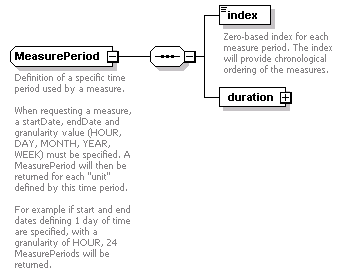| diagram |  |
||||
| namespace | http://base.api.ec.n2.tibco.com | ||||
| properties |
|
||||
| children | index duration | ||||
| used by |
|
||||
| annotation |
|
||||
| source | <xs:complexType name="MeasurePeriod" abstract="true"> <xs:annotation> <xs:documentation>Definition of a specific time period used by a measure. When requesting a measure, a startDate, endDate and granularity value (HOUR, DAY, MONTH, YEAR, WEEK) must be specified. A MeasurePeriod will then be returned for each "unit" defined by this time period. For example if start and end dates defining 1 day of time are specified, with a granularity of HOUR, 24 MeasurePeriods will be returned.</xs:documentation> </xs:annotation> <xs:sequence> <xs:element name="index" type="xs:int" minOccurs="1" maxOccurs="1"> <xs:annotation> <xs:documentation>Zero-based index for each measure period. The index will provide chronological ordering of the measures.</xs:documentation> </xs:annotation> </xs:element> <xs:element name="duration" type="MeasureDuration" minOccurs="1" maxOccurs="1"/> </xs:sequence> </xs:complexType> |
WSDL documentation generated by XMLSpy WSDL Editor http://www.altova.com/xmlspy